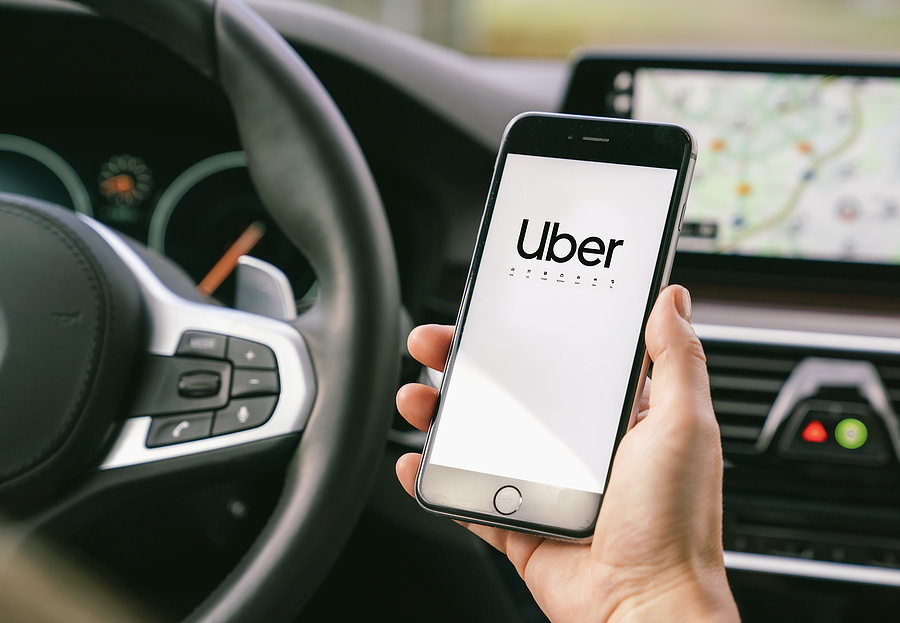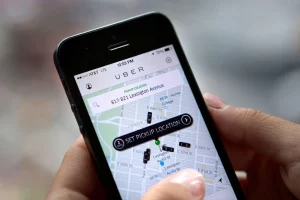
On July 10 2022, The Guardian published a leaked database of Uber’s activities, spanning about 40 countries from 2013 to 2017. The leak, which originated from former senior executive Mark MacGann included more than 124,000 files, and was quickly shared with the International Consortium of Investigative Journalists (ICIJ) and 42 other media outlets.
The leak included e-mails, iMessages and WhatsApp messages sent between senior Uber leadership, as well as memos, presentations and other internal documents. The documents reveal Ubers meetings and attempts to lobby powerful figures and heads of state, including: German chancellor Olaf Scholz, while mayor in Hamburg, Germany; former Chancellor of the Exchequer George Osborne; Irish prime minister Enda Kenny; Israeli prime minister Benjamin Netanyahu; UK prime minister Boris Johnson; U.S president Joe Biden, during his vice presidency; and French president Emmanuel Macron, who secretly aided Uber lobbying in France as a cabinet member of the French government. The files also document the use of tools, such as “Greyball”, used to mislead local police, and a kill switch which was deployed during police raids in order to conceal data.

Ubers Role:
The leaked documents showed that Uber launched a calculated campaign targeting leading media barons in Europe and India in order to secure more favorable treatment from their governments, Including the owners of major publications from the UK (the Daily Mail), France, Italy, India and Germany.
When Uber offices were raided by police or regulatory agencies, a “kill switch” was employed to cut access to the data systems and prevent access to evidence, a technique employed in France, the Netherlands, Belgium, India, Hungary, and Romania. E-mails show Kalanick and Europe legal director Zac de Kievit asking IT staff to kill access to computers; when the DGCCRF, Frances’s competition regulator, raided Uber’s offices in Paris, Kievit asked an engineer in Denmark to “please kill access now”. Kievit was eventually taken into custody in the Netherlands. The company claims the kill switches were intended to protect IP, customer privacy, and due process, as opposed to obstructing justice, and that no data was permanently deleted, but rather available for authorities to obtain later.
The ‘kill switch’ was implemented following a passenger assault in a New Delhi Uber in December 2014, which temporarily withdrew Uber and forced them to manage operations through an Indian subsidiary. Uber likewise ran into disputes with the Reserve Bank of India, the Income Tax department and consumer courts. The Indian Express also reported that safety features mandated by the Delhi Government, such as a panic button, were not present in Ubers or simply did not work.
In a leaked email, Uber Manager Rob van der Woude explained of the system: ” Whenever the local team was called to provide … information, we shut them down from the system making it practically impossible for them to give out any info despite their willingness to do so. At the same time we kept directing the authorities to talk to [Uber] representatives instead.” In another message, Uber’s Asia head told employees “We will generally stall, be unresponsive, and often say no to what they want. This is how we operate and it’s nearly always the best”.
Meanwhile, with the use of a tool called Greyball, Uber would target select individuals (such as local police) with a bogus version of the Uber app, allegedly developed with the intention of evading the law where Uber’s practices were deemed illegal. This version would display nonexistent cars which, of course, would never actually arrive when called upon. Greyball was deployed in countries including Belgium, the Netherlands, Germany, Spain, and Denmark, with full knowledge of senior management including Kalanick and Pierre-Dimitri Gore-Coty.
The Washington Post reported that the documents, together with interviews with Uber drivers, showed Uber knowingly crafted working conditions that resulted in drivers barely earning enough to get by, and enabled a system which rewarded drivers who used schedules and routes that put them in harm’s way in violence-laden areas. In one exchange, Uber’s former CEO Travis Kalanick dismissed concerns from other executives that sending Uber drivers to a protest in France put them at risk of violence from angry opponents in the taxi industry, saying “I think it’s worth it, violence guarantees success, ” and further explained that “extreme right thugs” had infiltrated the protest and were “spoiling for a fight.”
Individuals Implicated:

Emmanuele Macron – Texts between Macron and Uber co-founder Travis Kalanick explain that he had brokered a secret deal with its opponents in the French cabinet, surreptitiously helping Uber expand in France while Macron was economy minister. After French police in Marseille banned one of Uber’s services, Macron further reassured Uber’s chief lobbyist in Europe that he would investigate the issue personally, and the ban was revoked two days later.
Neelie Kroes – The former EU digital chief is accused of secretly helping Uber by lobbying Dutch politicians, including prime minister Mark Rutte, while on a leave of absence from the European Commission. An Uber lobbyist reportedly told colleagues that her relationship with Uber was “highly confidential and should not be discussed outside this group,” and another message explains “her name should never figure on a document whether internal or external”. During this time, she had made a request to formally work for Uber, which was then denied by the president of the European Commission
Global Response:

In the days since the leak, the European Trade Union Confederation has since called for the suspension of parliamentary access passes for Uber staff, claiming that Uber was “lobbying hard to try and water down EU legislation on the rights of platform workers.” Additionally, taxi drivers across Italy have reportedly halted their vehicles in protest at the revelations on 12 July.
Meanwhile, shareholder rights law firm Johnson Fistel, LLP is investigating whether Uber or any of its executive officers violated securities laws by misrepresenting or failing to timely disclose material or adverse information to investors. The investigation will focus on investors’ losses, and whether they may be recovered under federal securities laws.
Where Guardian from Wertheim Global Comes into Play
In no uncertain terms, this was an inside leak. A company as large as Uber is certain to have a content server of enormous magnitude, and without the security which Guardian provides against insider abuse, this type of document leak was probably inevitable. Guardian, for its part, would have flagged a leak of this proportion well before it ever hit a 1% download mark. We’re not saying we support Uber, were just saying it was incredibly preventable. In other words, don’t let yourselves become the next big Guardian Scoop.

